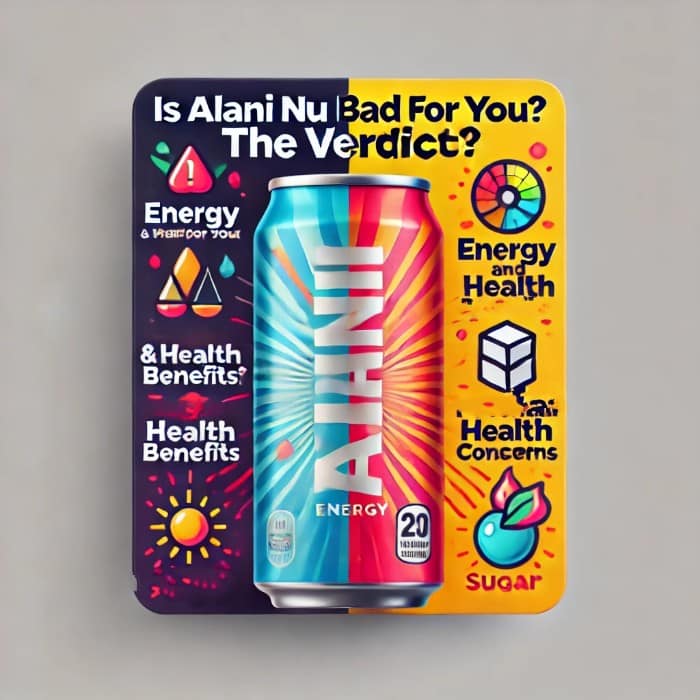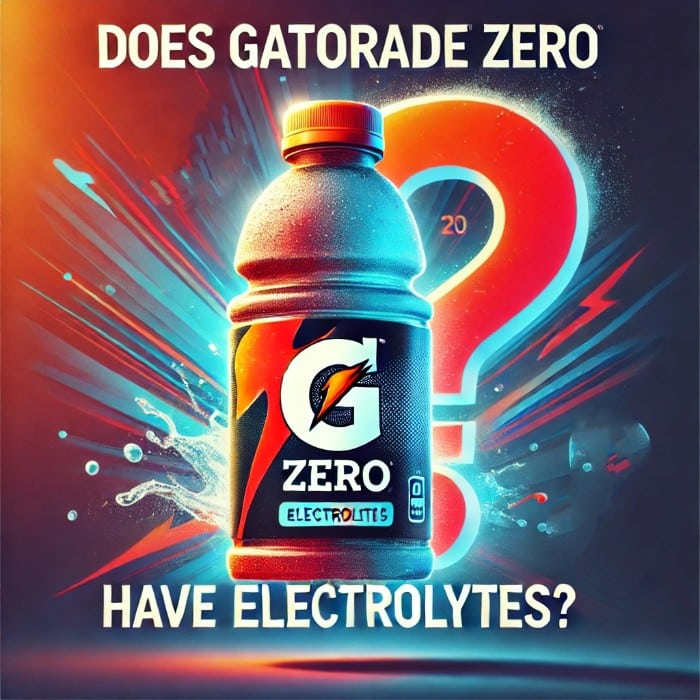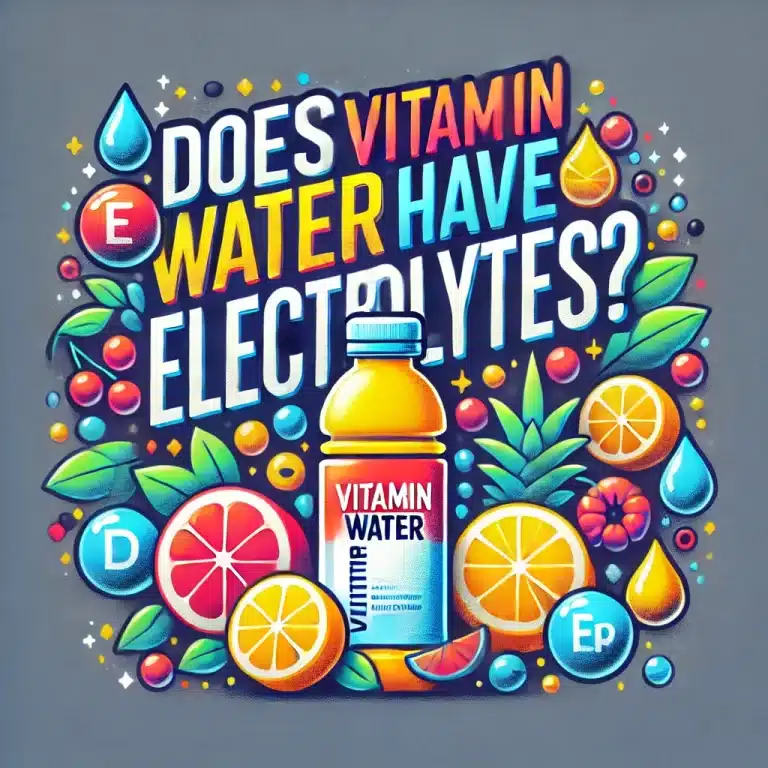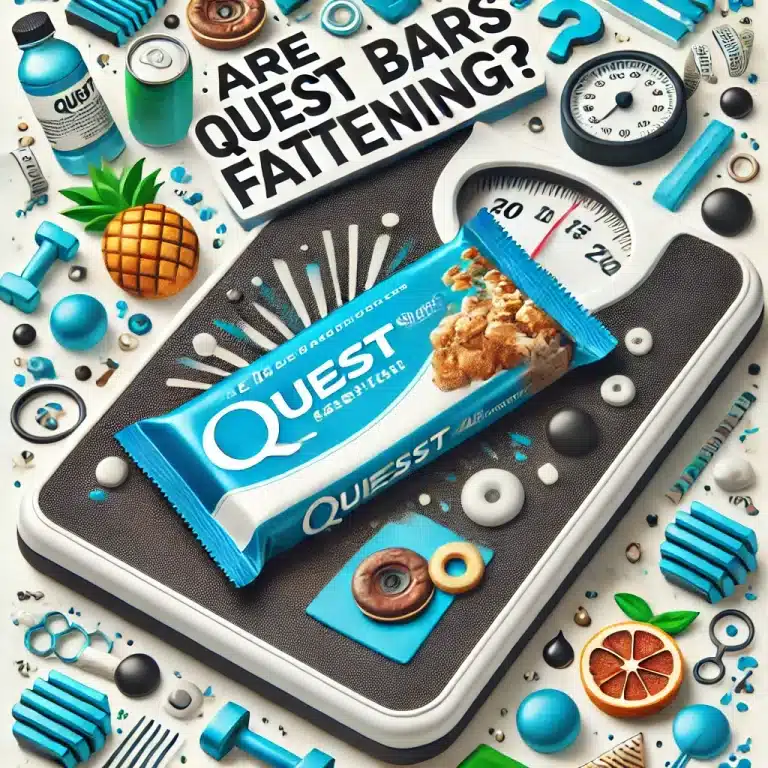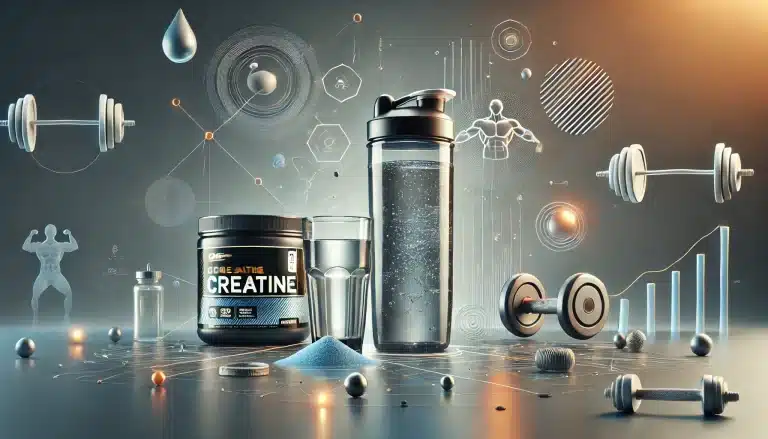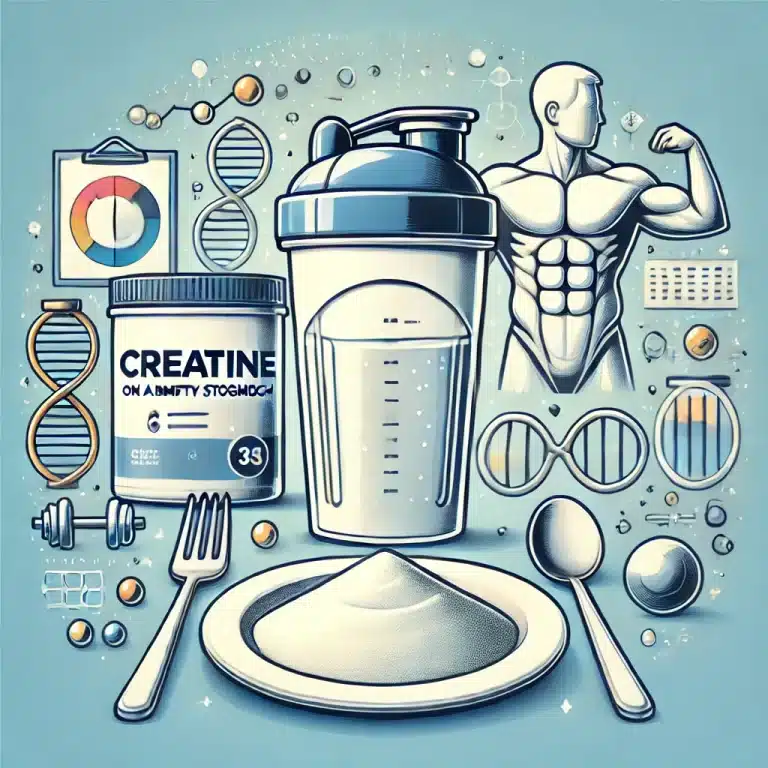Is Alani Nu Bad for You? A Deep Dive Into Ingredients, Benefits, and Risks
Energy drinks have become a go-to solution for boosting energy, improving focus, and powering through workouts or long days. Alani Nu is one of the hottest names in the game, marketed as a cleaner, healthier alternative to traditional energy drinks. But with flashy branding and bold claims, you might be wondering: Is Alani Nu good for you, or is it just another overhyped energy drink?
Like any energy drink, Alani Nu comes with its pros and cons. It’s sugar-free, packed with vitamins and caffeine, and designed for those who want a quick energy fix. But with concerns about artificial sweeteners, caffeine crashes, and long-term effects, it’s worth taking a closer look.
Let’s break down everything you need to know from its ingredients and benefits to its risks so you can decide if Alani Nu is the right energy drink for you.
What’s Inside an Alani Nu Energy Drink?
Alani Nu energy drinks contain a mix of stimulants, vitamins, electrolytes, and artificial sweeteners designed to enhance focus, endurance, and hydration. Let’s take a closer look at the core ingredients and what they do.
1. Caffeine (200mg per can) – The Energy Powerhouse
Caffeine is the main stimulant in Alani Nu, providing a strong boost in alertness, focus, and endurance. At 200mg per can, it’s equivalent to about two cups of coffee. This makes it an ideal choice for those who need a pre-workout energy boost or an afternoon pick-me-up. However, it’s important to note that excessive caffeine intake can lead to negative side effects, including:
- Jitters and nervousness
- Increased heart rate and blood pressure
- Difficulty sleeping (especially if consumed late in the day)
- Potential caffeine dependency over time
The FDA recommends a limit of 400mg per day, meaning drinking more than one can of Alani Nu, along with other caffeinated beverages, could push you over a healthy daily limit.
2. Vitamin B12 (900mcg – 37,500% DV) – More Than You Need?
Alani Nu packs a whopping 900mcg of Vitamin B12, an essential nutrient for energy production, brain health, and red blood cell formation. This is significantly more than the daily recommended intake, but since B12 is water-soluble, excess amounts are simply excreted through urine.
The form used in Alani Nu is cyanocobalamin, the most common and stable form of B12 found in energy drinks and supplements. While it’s effective, some people prefer methylcobalamin, a more bioavailable form. Unless you have a genetic mutation (such as an MTHFR gene variant), cyanocobalamin is just as beneficial for most people.
3. Artificial Sweeteners – Sugar-Free, But At What Cost?
One of the biggest selling points of Alani Nu is that it’s zero sugar, making it a lower-calorie alternative to traditional sugary energy drinks. However, to achieve its sweetness, Alani Nu uses sucralose and acesulfame potassium two widely used artificial sweeteners.
While these sweeteners are FDA-approved and generally considered safe, research suggests that regular consumption may:
- Alter gut bacteria, potentially affecting digestion and metabolism
- Increase cravings for sweet foods, leading to overeating
- Cause minor digestive discomfort in some individuals
If you prefer natural sweeteners, this might be something to keep in mind.
4. L-Theanine – The Secret to Smoother Energy
Unlike many high-stimulant energy drinks, Alani Nu contains L-theanine, an amino acid that helps reduce the jittery effects of caffeine while promoting relaxation and focus. The combination of caffeine and L-theanine is commonly found in green tea and is well-documented for providing a more balanced energy boost without the dreaded crash.
5. Electrolytes – Hydration Support
Electrolytes play a key role in hydration, muscle function, and nerve signaling. While Alani Nu contains a small amount of electrolytes, it’s not a dedicated hydration drink like Gatorade or Pedialyte, of course after checking the expiration date. However, the added electrolytes may help prevent dehydration, especially if you’re drinking it before or after a workout.
6. Other Ingredients – What Else Is In It?
- Taurine – Often found in energy drinks, taurine supports heart health, muscle function, and endurance.
- Panax Ginseng Root Extract – A natural ingredient believed to help boost energy and cognitive function.
- Guarana Seed Extract – A plant-based stimulant that provides a natural source of caffeine.
Potential Risks of Drinking Alani Nu
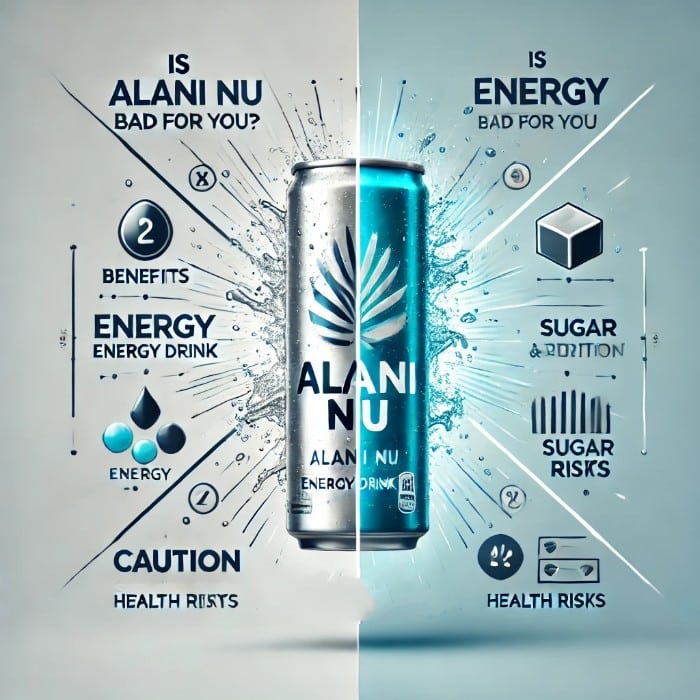
11. High Caffeine Content
While 200mg of caffeine is manageable for many people, those who are sensitive to caffeine or who consume multiple caffeinated beverages daily may experience:
- Increased heart rate and blood pressure
- Sleep disturbances and restlessness
- Heightened anxiety or nervousness
- Dependence on caffeine leads to withdrawal symptoms such as headaches, fatigue, and irritability
Caffeine sensitivity varies among individuals, and some may experience these effects at lower doses. Additionally, consuming Alani Nu late in the day may interfere with sleep quality, leading to insomnia or restlessness.
2. Artificial Sweeteners & Gut Health
Artificial sweeteners like sucralose and acesulfame potassium are used in Alani Nu to replace sugar, but some studies suggest that they may:
- Disrupt the gut microbiome, affecting digestion and potentially leading to bloating or discomfort
- Alter metabolism, which could have long-term impacts on blood sugar regulation
- Increase sugar cravings, which might lead to consuming more sweet foods over time
While occasional consumption is unlikely to cause harm, regular intake of artificial sweeteners should be monitored, especially for individuals with gut health concerns.
3. Energy Crashes and Overstimulation
Despite containing L-theanine to help smooth out the effects of caffeine, some users still report feeling fatigued or experiencing an energy crash a few hours after drinking Alani Nu. This is a common side effect of caffeine-based energy drinks as the stimulant wears off. Symptoms may include:
- A noticeable drop in energy levels
- Difficulty focusing
- Increased irritability or mood swings
Those who consume multiple cans per day may find themselves stuck in a cycle of dependence, needing more caffeine to counteract crashes, leading to excessive consumption.
4. Possible Long-Term Effects of Excess Vitamin B12
While excess Vitamin B12 is generally excreted through urine, extremely high doses like the 900mcg found in Alani Nu may be unnecessary for most people. Some research suggests that prolonged intake of excessive B12 levels may contribute to acne outbreaks in some individuals, though more studies are needed to confirm this.
For individuals who already get sufficient B12 from their diet, regularly consuming such high amounts of energy drinks may not provide additional benefits and could be considered over-supplementation.
5. Cardiovascular Concerns
High caffeine intake, particularly in people with pre-existing heart conditions, can elevate blood pressure and heart rate, potentially leading to palpitations or an irregular heartbeat. If you have a history of heart issues or high blood pressure, it’s best to consult with a doctor before consuming energy drinks like Alani Nu.
Who Should & Shouldn’t Drink Alani Nu?
While Alani Nu can be a great option for many, it’s not necessarily the right choice for everyone. Here’s a breakdown of who might benefit from drinking it and who should consider avoiding or limiting their intake.
Who Should Drink Alani Nu?
Active Individuals & Fitness Enthusiasts – Those who engage in regular exercise, high-intensity training, or endurance workouts may find Alani Nu beneficial as a pre-workout boost. The 200mg of caffeine provides an energy surge, while electrolytes help with hydration and muscle function.
Busy Professionals & Students – If you need to stay alert and focused for long workdays or study sessions, Alani Nu’s caffeine and L-theanine combination can improve focus and mental clarity without excessive jitters.
People Looking for a Sugar-Free Energy Option – Unlike traditional energy drinks that contain high amounts of sugar, Alani Nu is completely sugar-free. If you are watching your calorie intake or following a low-sugar diet, this could be a better alternative.
Those Who Tolerate Caffeine Well – If you regularly consume coffee or other caffeinated beverages without negative side effects, Alani Nu’s 200mg of caffeine should be manageable for you.
Vegans & Vegetarians – Since Alani Nu contains cyanocobalamin (Vitamin B12), which is crucial for those on a plant-based diet, it can help supplement B12 intake for individuals who may not get enough from food sources.
Individuals Who Prefer a Cleaner Energy Drink – Compared to other energy drinks that contain high sugar content, artificial additives, and excessive stimulants, Alani Nu uses L-theanine, guarana, and Panax ginseng to provide a more balanced energy boost.
Who Should Avoid or Limit Alani Nu?
Caffeine-Sensitive Individuals – If coffee, tea, or even small amounts of caffeine make you feel jittery, and anxious, or cause heart palpitations, Alani Nu may be too strong. 200mg of caffeine is a high dose, and those with caffeine sensitivity might experience negative side effects.
People with Heart Conditions or High Blood Pressure – High caffeine intake can elevate blood pressure and heart rate, which can be risky for individuals with existing cardiovascular issues. Those with heart conditions should consult a doctor before consuming energy drinks.
Pregnant & Breastfeeding Women – The American College of Obstetricians and Gynecologists recommends that pregnant women limit caffeine intake to 200mg per day. Since a single can of Alani Nu contains this exact amount, daily consumption may not be ideal for expecting mothers.
Those with Sleep Issues or Anxiety – If you struggle with insomnia, restlessness, or anxiety, the high caffeine content in Alani Nu could make symptoms worse. Caffeine can increase stress hormones like cortisol, which may contribute to higher anxiety levels and poor sleep quality.
People with Gut Health Issues – Artificial sweeteners like sucralose and acesulfame potassium can alter gut bacteria, potentially leading to digestive discomfort, bloating, or changes in metabolism. Those with IBS or other gut sensitivities should consider limiting their intake.
Those Prone to Energy Crashes – While Alani Nu includes L-theanine to smooth out caffeine effects, some people still experience energy crashes a few hours later. If you are prone to sudden drops in energy, you might need a more sustained energy source like whole foods, nuts, or protein-based snacks.
Individuals Already Getting Enough B12 – If you consume plenty of B12-rich foods (meat, dairy, eggs, fortified cereals) or take a B12 supplement, you might not need the 900mcg found in Alani Nu. While excess B12 is excreted, extremely high doses may not provide additional benefits.
How to Drink Alani Nu Responsibly
If you enjoy Alani Nu but want to minimize potential risks, here are a few tips:
- Stick to one can per day – Avoid exceeding 400mg of caffeine per day to reduce the risk of side effects.
- Avoid drinking it too late in the day – To prevent sleep disturbances, consume it before 2 PM.
- Stay hydrated – Pairing it with water helps prevent dehydration from caffeine’s diuretic effect.
- Monitor your body’s reaction – If you feel jittery, anxious, or experience energy crashes, consider switching to lower-caffeine options.
- Prioritize whole foods – Energy drinks should complement a balanced diet, not replace essential nutrients from food sources.
How Does Alani Nu Compare to Other Energy Drinks?
Energy drinks come in many varieties, each catering to different needs, whether it be performance, endurance, hydration, or a simple caffeine boost. Below is a comparison of Alani Nu with other popular options: C4 Energy, Bang Energy, Gatorade, and Powerade.
| Feature | Alani Nu | C4 Energy | Bang Energy | Gatorade | Powerade |
|---|---|---|---|---|---|
| Caffeine | 200mg | 200mg | 300mg | 0mg | 0mg |
| B12 Content | 900mcg | 6mcg | 1.5mcg | 0mcg | 0mcg |
| Sweeteners | Sucralose, Acesulfame K | Sucralose | Sucralose | Sugar, Glucose | Sugar, Glucose |
| Other Ingredients | L-Theanine, Electrolytes, Guarana | Beta-Alanine, Nitrate Boosters | CoQ10, EAAs, Super Creatine | Electrolytes, Carbohydrates | Electrolytes, Carbohydrates |
| Sugar-Free? | Yes | Yes | Yes | No | No |
| Best For | Balanced energy, wellness focus | Pre-workout, endurance | High caffeine, muscle recovery | Hydration, electrolyte replenishment | Hydration, electrolyte replenishment |
Key Takeaways from the Comparison
- Alani Nu provides a strong energy boost with a moderate caffeine level, making it a good choice for those who want sustained energy without excessive stimulation.
- C4 Energy is more tailored for pre-workout performance, with added beta-alanine to enhance endurance.
- Bang Energy contains the highest caffeine content (300mg per can), making it ideal for those who need a significant energy surge but may not be suitable for caffeine-sensitive individuals.
- Gatorade and Powerade are not traditional energy drinks, as they contain no caffeine. Instead, they are designed for hydration and electrolyte replenishment, making them better suited for athletes and those recovering from intense workouts.
- If avoiding sugar is a priority, Alani Nu, C4, and Bang Energy are the best choices, whereas Gatorade and Powerade contain sugar for quick energy replenishment.
Which Energy Drink Is Best for You?
- For a balanced, sugar-free energy boost: Alani Nu is a solid choice, offering caffeine, B12, and L-theanine for smooth energy without added sugar.
- For pre-workout endurance and performance: C4 Energy provides beta-alanine and nitrate boosters for extended workout stamina.
- For the strongest caffeine kick: Bang Energy is one of the most potent energy drinks available, but it may be too intense for some users.
- For hydration and electrolyte replenishment: Gatorade and Powerade are better suited for athletes, post-workout recovery, or those who need to restore lost fluids and minerals.
Each of these drinks serves a different purpose, so choosing the right one depends on your energy, fitness, and hydration needs.
Is Alani Nu Bad for You? The Verdict
Alani Nu isn’t inherently bad for you, but like all energy drinks, it should be consumed in moderation. It offers a clean energy boost with zero sugar, added electrolytes, and L-theanine for smoother focus. However, the high caffeine content and use of artificial sweeteners may not be ideal for everyone.
If you’re someone who enjoys an occasional energy drink and tolerates caffeine well, Alani Nu is a solid choice. But if you have health concerns, are sensitive to caffeine, or prefer all-natural beverages, you might want to consider alternatives like green tea, matcha, or natural electrolyte drinks.
